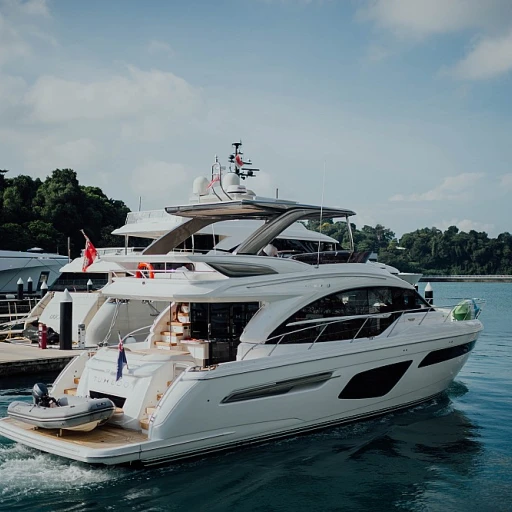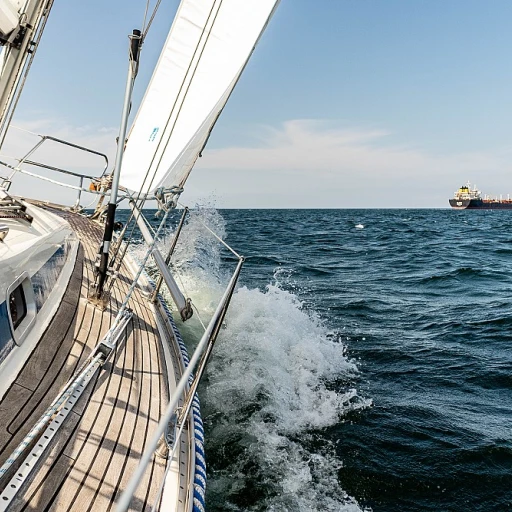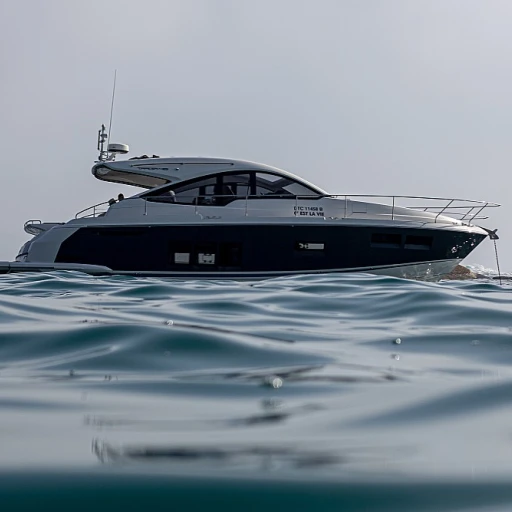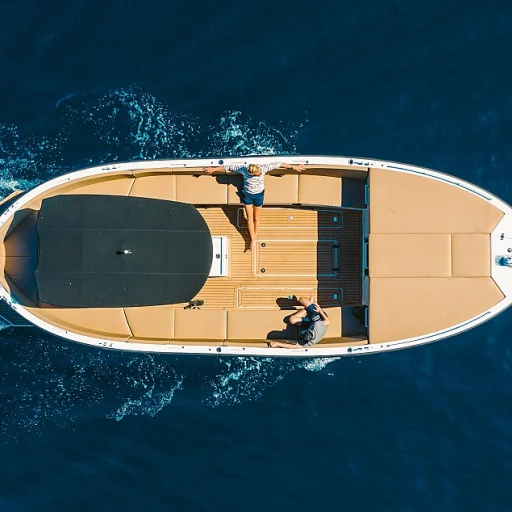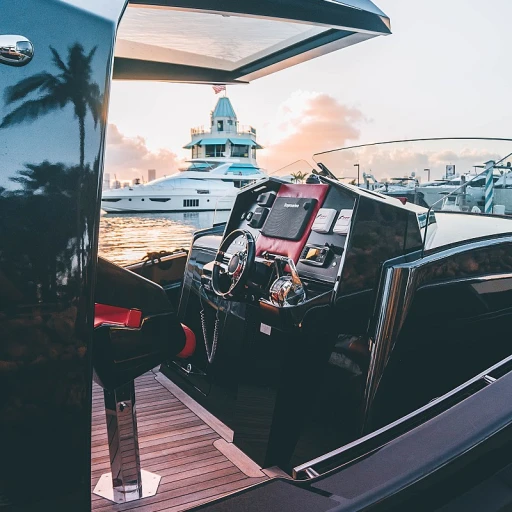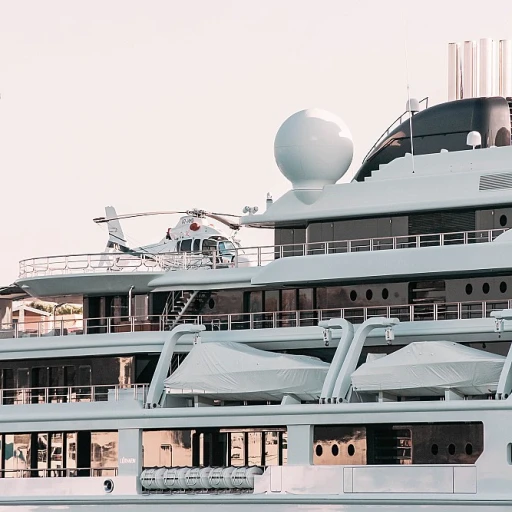The Role of Outboard Boat Gas Tanks in the Yacht Industry
Importance of Gas Tanks in the Yacht Landscape
In the yacht industry, outboard boat gas tanks are pivotal, serving as the essential fuel reservoir that powers the beating heart of your vessel—the engine. Without a properly functioning fuel tank, an outboard motor, whether an outboard marine engine or another type, will struggle to perform, potentially leaving you stranded at sea. It's also worth noting that integrating strategic fuel systems can directly influence marine fuel efficiency. To optimize this critical component, many owners are exploring
elevated yacht fuel efficiency techniques, highlighting the importance of fuel tanks in the overall performance and sustainability of any yacht.
Whether you're gearing up for a day of fishing on your boat or outfitting your vessel with hunting accessories, a reliable gas tank is non-negotiable. It's the unseen backbone of your boating adventure, underpinning every nautical mile you traverse.
This core component possesses an intricate relationship with newer marine fuel innovations, advancing from traditional heavy tanks to more portable variations, providing easy carry solutions for both small-scale boating trips and larger, more demanding marine excursions. These advancements mirror a dedicated focus on both fuel efficiency and environmental stewardship.
As you assess your own marine endeavors, consider how your choice of outboard gas tanks reflects not only your functional needs but also your commitment to marine sustainability. By understanding this, you not only enhance your boating experience but also contribute positively to the industry's evolution.
Materials and Design Innovations in Gas Tanks
Innovations in Tank Materials and Design
In the evolving world of the yacht industry, the materials and design of outboard boat gas tanks have undergone significant innovation. The need for reliable and efficient fuel storage is critical, and advancements in material science are providing solutions that meet these demands.
Modern gas tanks are often crafted from high-density polyethylene, a robust plastic known for its durability and resistance to impact. This material is not only lightweight but also resistant to corrosion, making it an ideal choice for marine environments where exposure to saltwater and varying temperatures is a constant concern. The durability of these tanks ensures a long life span while providing peace of mind to yacht enthusiasts.
Design plays a crucial role in enhancing both the functionality and the user-friendliness of fuel tanks. Some tanks feature ergonomic designs that allow for easy carry and installation, accommodating the needs of those who frequently switch between hunting and fishing activities. This adaptability is essential for yacht owners who require flexibility in their marine environments.
Additionally, innovations such as built-in tactile feedback systems are emerging, providing users with real-time insights into fuel levels. This is particularly beneficial for those embarking on extended fishing or hunting clothing expeditions, offering reassurances on fuel availability without manual checks.
The integration of collapsible tank designs is also gaining traction. These portable options serve to maximize the utilization of onboard space—a crucial factor in smaller boats or tight storage conditions. Whether you’re managing multiple fuel tanks for a view fishing experience or simply need to stow jackets coats and other accessories, collapsible tanks offer convenience without compromising on capacity.
Finally, the introduction of transparent tanks or those with clear view panels allows users to visually monitor fuel levels, reducing the risk of running out during critical boat gas operations. This kind of innovation aligns with the growing demand for user-centric, efficient, and environmentally friendly solutions in the marine fuel sector.
For more insights on essential marine accessories and their advancements, explore
the importance of anchors for jetskis, which are integral in maintaining stability and security while navigating the waters.
Maintenance Tips for Optimal Performance
Keeping Outboard Gas Tanks in Top Shape
Proper maintenance of your outboard boat gas tanks is essential for ensuring optimal performance and longevity. Regular checks and upkeep can prevent issues such as leaks, fuel contamination, and inefficiencies that could potentially hinder your boating experience. Here are some practical tips to maintain your marine fuel system:
- Regular Inspection: Frequently inspect the gas tank for any signs of wear or damage. Check for cracks, dents, or corrosion, especially at the seams and connection points to the portable fuel system.
- Clean the Tank: Keeping the inside of your tank clean is crucial. Periodically flush the gas tank to remove debris and water, which can accumulate over time.
- Seal Integrity: Ensure that the tank's sealing capabilities remain intact. A compromised seal can lead to fuel evaporation and leaks, impacting boat fuel efficiency.
- Replace Old Components: Over time, rubber fuel tank lines and other components wear out. Replace them with high-quality marine grade accessories to maintain performance and safety.
- Use Stabilizers: During periods of inactivity, adding a fuel stabilizer can prevent degradation and maintain the quality of fuel in the tank outboard.
- Proper Storage: Store the fuel tank in a dry, cool place when not in use to prevent moisture buildup and rust. This is especially useful for portable options that you ‘easy carry’ off the boat.
By incorporating these maintenance tips into your routine, you'll not only enhance the functionality of your boat's fuel system but also contribute to the vessel's overall health. For additional insights on maintaining other yacht components, you might find this guide on maintaining your yacht's canvas helpful.
Safety Measures and Regulations
Ensuring Safety with Outboard Marine Fuel Systems
Safety is paramount in the yacht industry, particularly when it comes to handling fuel systems such as gas tanks. With numerous factors at play, marine fuel tanks require careful consideration and adherence to regulations to ensure a secure boating experience.
To start, understanding the specific regulatory requirements for outboard motor fuel tanks is crucial. These regulations often address the materials used in the construction of fuel tanks—ensuring that they are robust enough to withstand the marine environment and prevent leaks. Moreover, regulations may specify the proper installation practices, which are essential for minimizing risks.
Additionally, boat owners should be diligent in maintaining tanks to prevent hazards. Regular inspections can help identify potential issues like corrosion, wear, or damage in portable fuel containers and fixed tanks alike. This proactive approach is essential in detecting small problems before they escalate into significant safety threats.
To enhance safety further, outfitting your boat with appropriate gas tank accessories is advisable. Safety switches and proper seals are indispensable additions that can prevent unintended fuel leaks. Consistent feedback from the fuel system, such as through gauge and sensor readings, can offer timely alerts that contribute to overall safety.
Finally, questions of safety frequently intersect with other considerations such as environmental impacts and efficiency. By maintaining fuel tanks properly, yacht enthusiasts not only safeguard their marine adventures but also contribute positively to environmental sustainability by preventing unnecessary fuel spills or leaks.
An informed view of safety in relation to outboard marine gas tanks can increase the longevity and security of your boating experiences, ensuring smooth sailing across all marine environments.
Fuel Efficiency and Environmental Considerations
Maximizing Fuel Efficiency and Minimizing Environmental Impact
In the context of marine ventures, how your tank performs directly influences fuel efficiency. Efficient usage not only translates to cost savings but also minimizes environmental impacts, highlighting the importance of optimizing your boat's fuel system.
Modern advancements in the marine industry's outboard motor design have been pivotal. Innovations lead to enhanced distribution of gas and improved outboard marine efficiency, which helps reduce the ecological footprint. With a focus shifting heavily towards environmentally friendly solutions, technologies are evolving rapidly to support this mission.
Moreover, adopting eco-conscious habits in your fishing or hunting expeditions can make a significant difference. Simple strategies such as carrying precisely measured boat fuel tanks can prevent overfilling and spillage. Transitioning to portable fuel options like portable fuel tanks, which are easy to carry, also ensures fuel is not wasted unnecessarily, supporting sustainability efforts.
From engine tuning to the choice of materials used in the marine fuel tanks, each component plays a crucial role in managing emission reduction. The type of gas tank and its overall design influence the efficiency of your outboard boat, effectively reducing your vessel's carbon footprint. Opt for gas tanks constructed with eco-friendly materials, improving fuel storage and distribution.
A thorough review and regular feedback on how your gear performs—including jackets coats for optimal comfort while tending to your boat gas needs—inform the choice of the right accessories. Adhering to these fuel efficiency strategies, in alignment with environmental considerations, is establishing a new standard in the yacht industry, ensuring a greener approach to marine exploration.
Future Trends in Outboard Boat Gas Tanks
Future Innovations on the Horizon for Outboard Boat Gas Tanks
In the evolving landscape of marine technology, the future of outboard boat gas tanks presents promising advancements that align with environmental consciousness and enhanced efficiency. Coupled with the ongoing innovations in materials and design, these tanks are expected to see a shift in trends that merge functionality with sustainability.
One key area of development is the utilization of eco-friendly materials in gas tank production. The industry is leaning towards materials that not only ensure durability and leak-proof capabilities but also contribute to a reduction in the carbon footprint. The integration of advanced polymers and composite materials can lead to lighter, more efficient tanks that complement the lightweight design of modern outboard motors.
Moreover, the emphasis on optimizing fuel efficiency continues to drive innovation in gas tank design. The implementation of intelligent fuel systems that offer real-time feedback and analytics can significantly enhance fuel management. These systems are being designed to ensure optimal fuel utilization, maximizing the output of each gallon of gas, reminiscent of the advancements in engine technology and tuning.
In pursuit of environmental sustainability, there's a clear focus on developing tanks that minimize fuel evaporation and degradation, thereby reducing emissions. This aligns with global marine regulations that aim to mitigate the environmental impact of boating. Such measures ensure that portable fuel tanks can meet rigorous safety and environmental standards, a topic covered extensively within safety measures and regulations.
Furthermore, the integration of smart technologies into boat gas tanks is an exciting frontier. With sensors and IoT connectivity, tank status can be monitored remotely, providing crucial data on fuel levels, potential leaks, and maintenance needs. This connectivity facilitates proactive maintenance, ensuring that tank systems remain in prime condition for every boating excursion.
In the world of marine accessories, these advancements are not just limited to the tank itself but extend to the broader fuel system. The connections, hoses, and fittings that interact with these tanks are also evolving to support enhanced fuel efficiency and environmental safety standards.
As we look forward to what the future holds for outboard marine tanks, it's clear that the focus remains on creating a seamless, environmentally-friendly boating experience that satisfies both regulatory requirements and the passion for marine adventure.


